#and even then I often don't feel understood because of how. well. low functioning we are.
Explore tagged Tumblr posts
Text
the OSDDID community on instagram is.... something else. even the adults who seem to be relatively rational and mature end up engaging in petty, hypocritical behavior like high schoolers and it makes me roll my eyes. I haven't been actively involved in system communities for a while, and honestly I don't see a point to going back.
#the amount of drama + immaturity is on every god damn platform#and it's so hard to find people my age who are years into knowing about their systems.#and even then I often don't feel understood because of how. well. low functioning we are.#six years of this and for what???#it feels like we just get worse and lose more communication#or maybe more accurately our knowledge of the system and parts expands and shows us just how little communication or cohesion#or understanding#that we really have#maybe I just need to talk to more polyfrag people
13 notes
·
View notes
Text
The thing about indirect requests (or passive aggression) is that they become common in people because the outcome of asking isn't always yes, it's often no. Sometimes, having asked the question explicitly and being rejected is a more painful outcome than deliberately not asking and consoling oneself that one's loved one has simply failed to understand the request. You can frame it in terms of game theory, even.
Imagine you want something (could be a cheap snack, could be a big ask like an expensive appliance--and bearing in mind that money, time, and space all have value in your life). You could survive without it, but it would be really nice to have. You ask your partner, who's supposed to be a person who cares about you, to do something for you.
Either way you choose, you have two potential outcomes.
If you choose to use your words and ask directly for what you want, you may receive...
A glad "oh, of course!" and the thing you asked for (success),
a demurral of some intensity depending on how much the other person values your relationship and your happiness (failure), in which you may also discover exactly how much they do (or don't) value you (big failure). This is especially painful if your partner rejects you publicly, if they are scornful or aggressive about it, and if the request you made required very little effort.
If you choose to ask indirectly and just express how nice it would be to have something, you may receive...
a warm reward when your spouse reveals that they just so heard you might enjoy the thing you asked for (success), potentially with the extra boost that shows you exactly how carefully they listen (big success!), or
the status quo: you continue to not have the thing you want, but you also get to not have the conversation or any consequences of rejection.
I said game theory because you can vary how likely each outcome is by varying the function that describes the probability of successful requests. That is, say the likelihood of success (your partner gives you the thing) S(x,y,z) = [f(x) - g(y)] * h(z), where x is the level of value they place on your relationship, y is the amount of effort required by the request, and h(z) describes the likelihood of your partner correctly noticing your request with explicitness level z. Each person has their own peculiar f(x), g(y), and h(z) functions that vary independently of one another; h(z) is bounded between 0 and 1 (that is, it can never be negative, it can never be greater than 100% probability of being understood). Change your strategy accordingly, given that your partner is a familiar individual whose responses you are able to observe and predict.
The thing is, it doesn't become worth it to be more muted and subtle about your requests unless you think your odds of success S(x,y,z) are probably pretty fucking low. You're a human, so you can't really control the level of effort the things you want require. But you sure can decide whether or not to ask, and you can decide how obviously you want to ask. If explicit requests typically carry the risk of explicit rejection, and that sucks, you get more indirect about the things you think might get rejected. if that's most of the requests you make, well, you develop certain habits about asking.
the other thing is, we learn from experience, not just from our partners but throughout all our lives. All these dynamics also carry over for coworkers and siblings and parents and friends. and we learn our value from the frequency with which we hear "yes."
it's so easy to get in the habit of not asking explicitly, because the explicit rejection hurts more: at least the implicit one leaves you some comforting illusions, or maybe fantasies, of the problem being about being noticed rather than being valued. hurts less.
so if you are having an access conflict, where one partner needs assistance feeling safe making explicit requests and one needs assistance parsing the requests, there needs to be a discussion about how the situation can be adapted to support both parties through the problem. it is, funnily enough, quite possible to be both partners at once.
very possible. and neurodivergent folks are very prone to both ends of the breakdown. so, you know, friends. we ought to be talking explicitly about how to do things better amongst ourselves. yes?
I've seen a lot of "You have to communicate directly/don't expect other people to read your mind" posts going around tumblr lately and while I really do appreciate them because it's a skill a LOT of people need to work on, I do want to remind everyone to please meet people halfway sometimes.
I recently read a story on Reddit about a guy's pregnant wife texting him "I'm craving donuts but we don't have any in the house 😔" and he DIDN'T stop to pick up donuts on the way home from work. Everyone was taking his side because "she needs to communicate" and "he's not a mind reader" and "How was he supposed to know she wanted him to get donuts???" People, ffs, why on earth would she text him that while he was at work if not because she wanted him to get donuts? I was flabbergasted everyone was taking his side. "How was he supposed to know??" What? Like yeah it's true she didn't say "I want you to get me donuts" with those exact words in that exact order but the reason why people get upset if they hint they want you to do something and you don't do it is because they feel like you don't care about them and aren't actively thinking about their feelings. Especially in a marriage or LTR they are in a situation where the assumption is you care about filling the other person's needs.
Someone who loves and cares about someone will get the donuts "without being asked" just because their partner expresses a want or need. That's what someone is fishing for when they say "Aaaah I'm craving donuts 🥺🥺🥺" It's less about the donuts and more about feeling cared for. Sometimes straight up asking "Can you get me donuts?" defeats the purpose.
Also, women are typically socialized to communicate this way because they're punished socially for being too direct. I've heard that people of color, especially black people, often do this too because they're likely to be branded as "aggressive" if they're too direct with white people. So it might be a good idea to be a bit intersectional if we're trying to encourage people to be more direct.
Take the stereotypical example of a wife gets a new haircut and then gets upset that the husband doesn't notice. She's not literally mad at him for not saying the exact words "I like your new haircut." She's upset because she feels like he doesn't look at her and appreciate the efforts she's putting in anymore.
Obviously this will vary widely depending on the nature of your relationship with someone, but especially when it comes to intimate partnerships, there are certain things your significant other should not have to tell you directly. It's probably safe to assume your wife or husband wants a birthday present even if they don't ask for it. It's probably safe to assume your bf or gf would appreciate a valentine's day present or a compliment without them having to literally ask for it, unless they explicitly say otherwise.
This is difficult for a lot of neurodivergent people to learn manually if it's not instinctual and they didn't learn it growing up (lord knows I didn't) and yes, it's true that most people (especially NT people) should learn to communicate more directly. But also, your relationships would probably benefit from learning to read indirect cues and just pick up the donuts on the way home because you heard your wife is craving them. Sometimes what someone wants is for you to think about what they're feeling and what they want and do it without them asking directly. It's up to you whether or not you do that, but sometimes that is asking. I think this is what people generally mean when they say their partner is "thoughtful."
2K notes
·
View notes
Note
I don't know if you're apart of the Supernatural fandom, but if you are, could you do a speech analysis for Dean Winchester? Thank you.
I am! I’ve fallen into (back) into SPN hell recently and gotten a ton of feels I did not expect, thank you very damn much. But anyway, yes I am happy to oblige.
Dean’s voice is very distinct, but I can see why it’s hard to grapple with for many writers because very seldom does he say what he means and very often when he does it’s wrapped up in humour or pain. It’s often quippy as a means of deflecting emotion or maintaining a status quo or emotional handle over a situation. He uses commands and charm and pop culture references but he’s a very complex character so sometimes that all disappears and he’s open and vulnerable and raw, and those lines can be hard to draw.
-
Notes
To understand Dean’s focal speech patterns, we first to recognize that we’ve known Dean for 15 years, and that people’s modes of speaking can and will change over time. We’re gonna focus on things that have stayed more or less consistent over time, and his ‘base’ speech patterns that make his dialogue him. I’ll mostly shy away from different eras but may highlight a few things, and the same goes for who he’s talking to because he’s pretty similar with his only major differences being a function of closeness. He’s not much of a conversational mimic so we don’t have to worry about that.
We’re also gonna state the obvious and contrast the type of conversation he might be having - whether he’s tied up or in danger vs. expressing emotions vs. focused on the job. That’s probably where the meat of this is for people who are interested in these kinds of analyses anyway :)
Also - this is 4200 words so I’m sure there are typos so just acknowledging that up front.
-
Sentence Style
Let’s start with overall style.
Dean’s speech is generally straightforward (when he’s not being referential) with a low proportion of adjectives and a decent amount of degree modifiers (more on that below). He uses simple sentences with clear statements, though will add clauses to clarify, reference, or add degree fairly frequently.
For example:
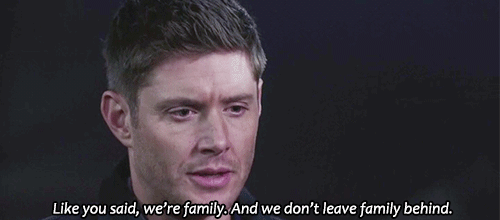
”Like you said” is acting here as a way to refer back to a previous conversation. Dean does this more when he’s stating something not about himself/his subjective experience, but stating an absolute (or at least something to be taken as absolute).
Also something to point out about this example: like I said he uses shorter, simpler sentences. While that isn’t always true of course, it definitely it is the case that he doesn’t tend toward long, breathless sentences. Even here he could have said this in one sentence and instead split it into two concrete points. A person could transcribe it differently (”Like you said, we’re family, and we don’t leave family behind.”) but he tends to speak in this manner that implies full stops between these separate statements.
(Later I’m gonna completely contradict myself by talking about his longer statements btw. He tends to use longer sentences in more serious conversations, and includes clauses that qualify the statement).
-
Declarative I-Statements
Dean uses a ton of declarative sentences starting with I. Like - a lot of people do. But Dean’s iconic quotes are often “I”, and a large proportion of his sentences are declarative sentences in the active voice centring around him, his opinion, or his experience of the world. From “I think he wants us to pick up where he left off - saving people, hunting things, the family business.” to “I think I’m adorable”, Dean likes to tell us what he thinks and what he is.
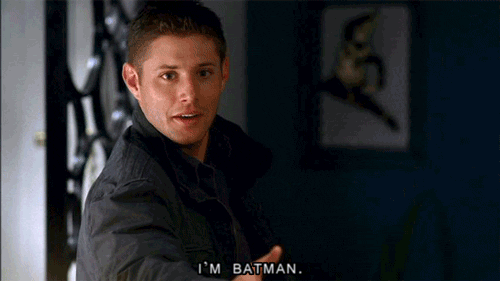
You can also extend this pattern to other sentences that might start with different words but carry the same thesis “Demons I get - people are crazy.” It could be reworded just as simply as “I get demons - people are crazy.” But if Sam were the one saying it? “People are crazy” seems just as likely (although I’d put my money on “what is wrong with people?” as Sam’s most likely statement if he were trying to get the same sentiment across). Sam would express it as an absolute about the world or a rhetorical question, rather than one focused around his view of the world. Which doesn’t make Sam less self-focused or idiocentric than Dean, but their speech patterns express different modes of seeing the world, and in some ways Dean’s vocal patterns do more to acknowledge that his view of the world is subjective (but also that his subjective view is all he really cares about anyway).

(see all the other gifs here. Think “I’m proud of us” and so many other lines. So many I-statements).
-
Imperative and Commands
Dean speaks in a lot of commands. Idk what else to tell you. He’s a natural leader and he takes charge of situations, so it’s just kind of a natural facet of his speech.
He does this with humour:
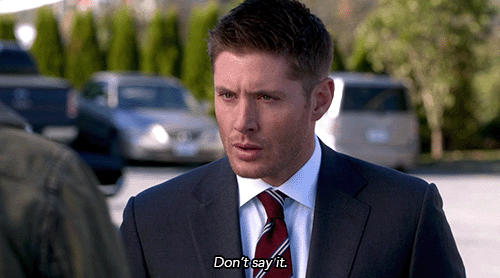
And without (”He asks, you answer! Then you shut your hole” for example).
Telling people what to do isn’t always met kindly, of course:

And although not an imperative sentence, he also is comfortable using speech to demand compliance:

-
Word Choices
One thing I like to always examine is word choice, contractions, and negation, so let’s dive in to that.
Diction
While Dean doesn’t flower up his language much in terms of verb and noun choice, that isn’t because he has a small vocabulary. I’d wager it’s a choice to being unpretentious because of the world he lives in. He never has any issue pulling out technical or clinical language:

(Also seen here: he tends to be very pithy and flippant, especially when he’s unimpressed with someone or with a situation, or wants to express annoyance and frustration. It’s his first-stop for “I dislike this”.)
We’ve seen him use words like Achilles’ Heel and describe how he made an EMF using technical language, so there’s no hesitancy to drop these terms, but for him it’s a matter of expressing what he wants to in a manner that will be easily understood by the person with whom he’s speaking.
-
Negation
For how he uses negation - Dean doesn’t say “ain’t” and he seldom said “[x]’s not”. His typical negation is “isn’t”.
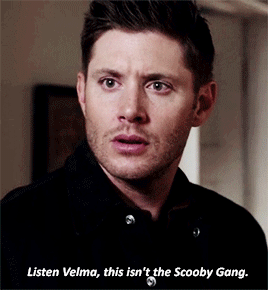
(Not “this ain’t the Scooby Gang” and not “it’s not / we’re not the Scooby Gang”. Isn’t. And yes, the line “there ain’t no me if there ain’t no you” bugs the hell out of me for this specific reason. When else have we ever heard him say ain’t? “There is no me if there is no you” is way more in keeping with his usual negation style.)
He also negates using the word Never. “I’ve never had anything this nice.”

Like this. And like this:

This is interesting because it fits into Dean’s pattern (discussed below) of using words (adverbs and swears alike) as ways to modify the intensity of his sentences. A lot of people use qualifiers to create this sense of degree (words like “really” and “very”). While Dean sometimes uses or combines those words with others (”really freakin’ hate this”), he does something that very few people do, which is use the qualifying word ‘never’ to express an absolute quality. Most of us can’t say we’ve never done something. We might say we “didn’t” do something, but we don’t express it as absolute as “never”. Dean does. Dean makes it clear what things simply do not get to be attributed to him or are not to be counted within his sphere of existence.
(He says it under less extreme circumstances too though...)
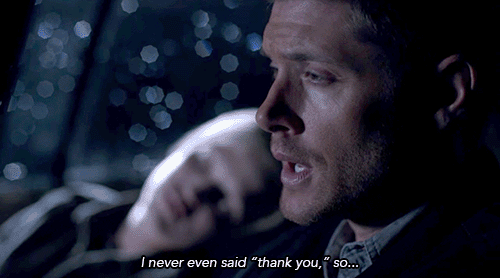
-
Contractions
Dean is liberal with his use of contractions and word shortenings. I’d recommend writing his use of words like “freaking” as “freakin’” “nothin’” and so forth. Can’t, not cannot.
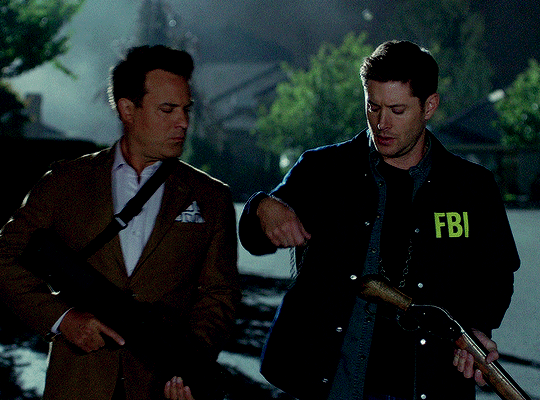
Gonna, wanna. You are going to want to = You’re gonna wanna. (Also “you’re gonna have to trust me”. He tells people what they’re gonna have to do a lot).
He uses other shortenings like “y’know” and “’cause” as well, when he’s relaxed at least. Like all of us, if he’s emphasizing those words he’ll enunciate fully, so try to match the contraction use to what you want to emphasize and to the tone you want to convey.
-
Addressing Others
I wasn’t sure what else to call these (linguists might have some idea), but I’m talking about the use of words like “man” “dude” and “y’know” (and even his “Listen Velma” above). He uses these words like we all do - to ensure the person we’re talking to is clear that we’re addressing them directly, calling them into the conversation. Dean uses ‘dude’ a frequent amount for Sam (and others) but also “Man” at times (especially when annoyed). He uses “brother” for Benny as well in S8 in the same manner.

Conversely, “y’know” tends to come up when he’s being sly or pithy. He doesn’t really use ‘Buddy’ except for strangers (but not like Sam who essentially uses it as a threat) and I can’t recall him saying ‘pal’.
-
Positive and Negative Words
Some generic positives: awesome, super (often sarcastic)
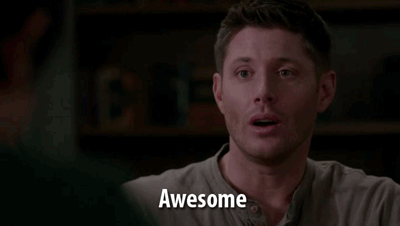
Some recurrent negatives: ugly, bad, douch-y

“It ends bloody. It ends bad.”
-
Expressing Emphasis
Look - Dean doesn’t use a lot of adjectives, but he does use a lot of degree modifiers/adverbs. One of those is “just”. “Just do [x].” “Just so you know.” Just.

(Even here, “I just”).
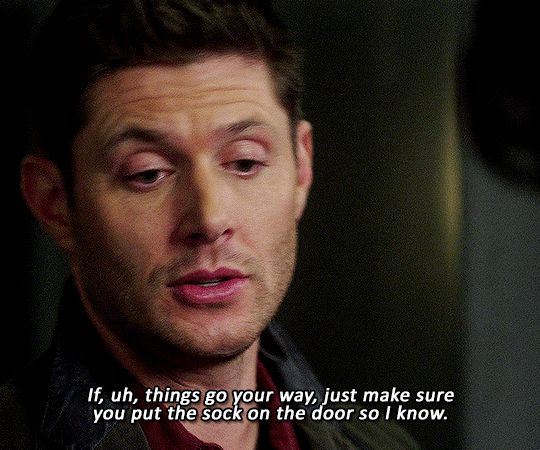
He also does a very neat thing with the word “Uh.” It’s used not to hesitate or equivocate, like most people might use it, but instead to increase attention to what he’s saying. A false-hesitancy which tends to both emphasize and diffuse what he’s saying a bit.

(It’s so neat!)
-
Swearing
There is absolutely no doubt that Dean is an avid curser. There’s an excellent 4th-wall-bending implication from 3x13 (Ghostfacers) where we see Dean (and Sam) dropping f-bombs and other swears that get bleeped out in the Ghostfacers documentary. Which allows us as the audience to realize they’re swearing all the time, but that the network doesn’t allow that kind of swearing, so we see a watered down version of their dialogue on screen.

Dean says “freaking” a lot, and I feel like we can assume that 9 times out of 10, he’s dropping an f bomb. His favourite exclamation is “son of a bitch”, but when he’s really pissed off, we get a “motherf*cker”. Seasons 4-8 his favourite thing to call people is a douche or douchebag if he looks down on them. In general my advice to authors would be not to hesitate to have Dean swear, but make sure you’re using them right.
While many swears are just exclamations or word replacement (”kicked my ass” instead of “kicked my butt”), a lot of the swearing that Dean does is specifically to increase emphasis to something in his speech. Adding in freaking/f*cking as an intensifier is probably its most common use for him.
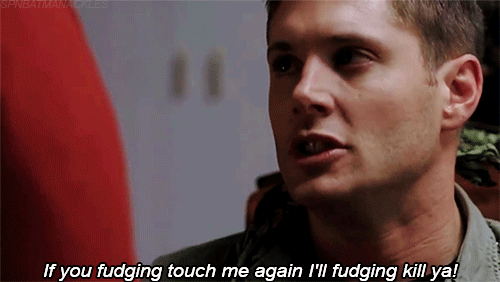
For the record, he uses “hell” in a similar fashion. What the hell, how the hell, where the hell - etc. Expressing intense emotions via swears that increase the degree/magnitude/intensity of the statement.
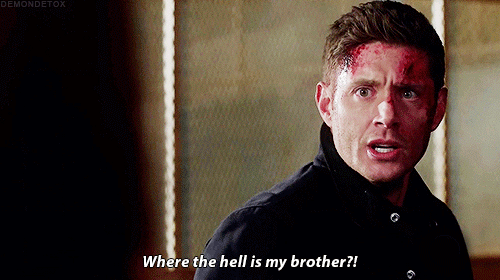
(Oddly enough, although Dean will insult people casually calling them douche, etc, when he’s pressed and angry and aggressive, his insults toward people don’t become vitriolic diatribes. Threats are more common, typically without an upscale in cursing, and so is being pithy to get them mad and distracted.)
-
Questions, Answers, and Emotions
Okay so one thing I have to address: I kind of setup a strawman in the opening about sentence length. Because sure, Dean uses a lot of shorter and more declarative sentences. But he’s a person, which means that the bulk of his speech is just speech. While all else being equal, he uses more shorter, i-statements, and more commanding language than others, he also has conversations. He’s got a great sense of humour and a bit of an acid tongue, even under pressure, so if you’re not writing him with some some glibness or humour (even when it comes out biting, frustrated or falls completely flat) you’re probably missing something.
And often, he expresses himself in questions. This humour and glibness can come out like: "What are you, the Dog Whisperer now?" in a less strained situation, or it can come out to try to keep his feels under wraps while seeking insight:

Of course it’s not all questions. Sometimes his glibness, including for his own life, comes out in the form of answers:

He’s being serious but totally glib about life and death, having accepted his fate. (Dean accepting his own mortality is kind of also a must, especially post S1 finale).
And sometimes he expresses pain and feeling as questions without any glibness at all:
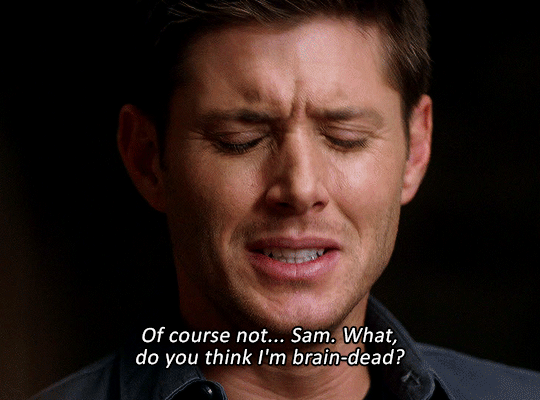
So to be clear, don’t write him as only ever using short i-declarations. Pepper those in, but remember that if he’s expressing an emotion or a vulnerability (even if he’s covering it with glibness), he’ll be using this roundabout way with questions or with indirect answers that don’t directly state his feelings but still manage to convey what he’s thinking.
-
Pleading
One more thing I want to touch on in this section: there are (probably surprising to some who aren’t looking) a lot of notes of supplication when he’s talking to others and feeling vulnerable. It’s very easy to think of Dean as someone who’ll never ask, never beg or plead. Because that’s what he wants you to think, because he’s the cool, in charge Han Solo type.
But Dean does ask. He pleads. He pleads to God/Chuck, he pleads to his father, to Sam, to Cass. A major difference between he and Sam is actually the situations in which they’re likely to say “please”. Sam’s likely to use it as a first response (and therefore says it waaaay more) but absolutely refuse to under duress. Dean will never ever use it as a first response, but will fall back and resort to it in the end. We could unpack what that means about their psyche, but we’re here for language.
Not too surprisingly, I’m having a hard time getting the gif search to grant me specific gifs of Dean saying ‘please’, but I can recall some instances. S1 finale, when Azazel is possessing John. First he starts with quips and pissing Azazel off, and then it’s “Don’t you let him hurt me!” and then when that fails, he begs his father to help him.
He pleads in S1 for Sam not to leave, because Sam is all he has left. He pleads with an angelic APB at the opening of S9 for an angel to save Sam. He tells Cass he needs him when Cass his pulverizing his face. “Please, he’s my brother”. Is that what he says to Lilith? Or was the ‘please’ implied there?
Here, instead of single gifs, you should get the full experience of the duress under which Dean will say please:
To God
To his dad
To his dad again
To Bobby
To Sam in an alternate timeline
And when he wants to be left alone the same thing occurs:
To his mother
To Sam
You get the idea. He doesn’t always say please. Sometimes it’s notes of supplication in his voice and sometimes it’s a somewhat desperate “c’mon man” when he doesn’t want to have to ask but he’s at the end of his rope.
(Okay final characterization note for this section - I also think Dean is probably useless against someone who looks up at him with wide sad eyes and says ‘please’ to him. I suspect part of why it’s his final defense is because he himself would be defenseless to that kind of plea from others, because he was hardwired from a young age to look after his infant little brother, and that involves a certain amount of responding to pleading and helplessness).
-
Pop Culture References
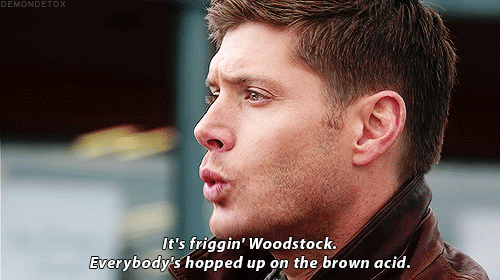
Dean uses a lot of highly referential language. He refers to bands and musicians, films, pop culture, current events and modern history, etc. Despite him not being overly tapped into social media (e.g., not knowing what myspace is in early seasons, among other things), it’s equally clear that he’s tapped into film, TV, music - any means through which he can consume content. This makes sense given how much driving time and downtime his life must have, with time in motels and between jobs to watch and rewatch the same media. Try to pepper in these sorts of references in as ways for Dean to describe what’s going on and relate new experiences to what makes sense to him.
If you’re a non-American writing him, or a very young American, it doesn’t hurt to brush up on music and media that were popular from the 80s and 90s, which will make up the core of Dean’s formative years and therefore references. There’s also evidence he knows a lot of pop culture history though so don’t hesitate to make references to films etc from any decade of the 20th century. He’s also a bit of a sci-fi nerd and we know he reads (including Vonnegut) so literary references are perfectly in order. I would shy away from references to historical fiction, Shakespeare, and instead keep it to genres we know he consumes (including cartoons!).
"You were wasted by a Teenage Mutant Ninja Angel?"
(ps - seriously just look at this post - we’ve got scooby doo and blues brothers and batman and I wasn’t even trying to find pop culture references when I gif searched).
-
Deeper Emotional Conversations
While I mentioned above that he uses questions and answers to roundabout discuss his feelings, not all chick flick moments can be handled in that manner, and many can’t be handled with glibness at all.
For Dean, directly addressing his deeper negative emotions is difficult, and thus becomes a pained pronouncement. The nuance tends to come through in his face and nonverbal cues so focus on those, but linguistic choices are pretty important here. And this is where directly naming his emotions comes in. Unlike that question/answer section above where his thoughts and feelings are conveyed without directly naming his sentiment, sometimes he is called upon to express his feelings more specifically.
Because let’s be honest, he’s got his A Single Man Tear(TM) and he’s got deep, painful feelings, but he sucks at talking about them.

Let’s create an example that isn’t something that specifically happened in canon, but easily could. So - let’s say that Dean might need to say he’s scared of losing Sam. That would come after some pained discussion and Dean will act like he’s having his teeth pulled, but he will say it. And when he does, it’s either an angry proclamation (”you want me to say it? fine! i’m scared, sam - i’m scared as hell that one day i’ll wake up and you’ll be gone.”) or he cracks himself open completely exposed and vulnerable, and all the air rushes from the room when you see it because his eyes are shining and it’s visceral and real and been sitting right below the surface, suffocated until this moment (”i’m scared, sam,” a crack in his voice, an inhale of breath, and he looks a second from losing it. but it’s dean so he won’t, he’ll hold on by the skin of his teeth with his heart spilling out of his mouth, red with the blood of his own truths. “i’m terrified of losing you.”).
There’s very little in between. There’s almost never any emotionally removed or more clinical discussion of his feelings like you might get with Sam. (”you want me to say i’m scared? of course i’m scared. i’m terrified, dean, but that’s not the point here. the point is -”). Because Dean struggles to accept and avow his painful internal emotional landscape, he struggles to discuss it in a way that’s removed, so it becomes very intense when he does.

What this also means for writing emotional dialogue is that although Dean does not lack insight into his emotions, where they come from, and why he’s feeling the way he is, he’ll very seldom provide you an in depth explanation. This may make him seem less emotionally mature, but really what’s happening is a struggle to put those feelings into words. Discussion of anxiety, insecurity, and trauma are put into boxes he can more easily communicate - fear, anger, violence. Less “I overreacted because I was scared of losing you” and more “I’m fucking terrified of losing you. And yeah, it pisses me off.” Dean doesn’t tend to use explanatory statements (”because”), he tends to present emotions and even concepts outside of emotional discussions as separate statements, and it becomes your job to then connect those statements (as the one he’s talking to, and as the audience).
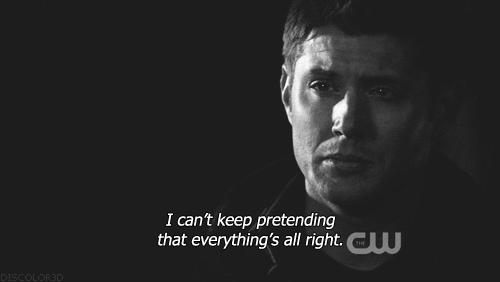
Like I said near the start, Dean also uses longer sentences when having serious conversations. “As long as I’m around, nothing bad’s gonna happen to you.” Note the first half of that sentence acting as a qualifier (implying something bad could happen, but not when Dean is around, creating the condition upon which the whole sentence and sentiment hangs).
-
Less Declarative Expression
Dean expresses negative emotions like disappointment and frustration as well, but unlike his more intense/extreme negative emotions (terror, fear of abandonment, deep anger) he very seldom will declare those emotions. While he might use question and answer format, he might also control the conversation with a straightforward expression that saves him from having to say what he’s feeling while still getting it across.
For example, "Well that's great, because without your power, you're basically just a baby in a trench coat." Instead of saying he’s frustrated, he says something that gets to the point of what he’s mad about without saying he’s mad. (This is especially true when what he’s mad about is the situation. Because while these statements are about people, on the balance of things, they’re not really directed at them. Because often he’s frustrated because of something they can’t solve and he knows that).
He’s also liable to not-declare-but-express pent up feelings he’s not ready to unpack in the same manner:
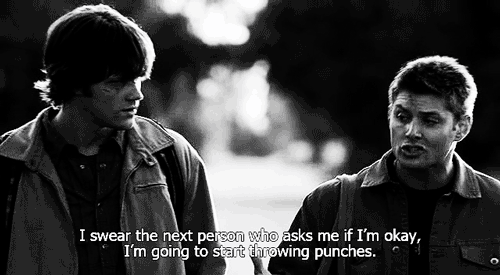
He’s obviously stressed and angry, but he doesn’t want to have to avow that anger and unpack all of where it’s coming from. It’s not the feeling of the emotion he dislikes so much as it is the examination of the underpinning reasons for it, because the dredge it up and unpack it is more painful than to let himself to continue to feel it at this low consistent level while he processes.
-
Outliers and End Notes
No post can fully capture and analyze 15 years of dialogue. There’s probably a million important elements to Dean’s speech that I missed. I think I want to emphasize a few things before we part.
First - if you really want to write Dean, make sure you write him as charismatic. He uses humor, charm, deflection, questions, commands, and confidence all to control conversations and he does it seamlessly. Despite his rakish nature, he seldom if ever seems to offend people (unless he’s deliberately trying to piss them off) and you should take that into consideration when writing him.
Keeping him fully in character will therefore involve a sort of fluidity about his speech, and those references. He is personable and exceptionally confident. He does not tend to hesitate or apologize (except in a flippant, superficial way, or in very strained emotional conversations and then only to those he loves deeply). His volume and tone are probably as or more important than his words, so consider when he’s saying something with a purr vs. with a snarl vs. shouting vs. having his voice crack into a whisper. He’s incredibly expressive with his face, but not overly gesticular with his hands (though he does gesture, just not in a way that stands out a great deal).
If you want or need him to give some type of confession in what you’re writing, you pretty much have two options. Either expressing his emotions in ways I’ve described here, or giving it the good ol’ S12 monologue where he bares his soul (when he’s inside Mary’s head). That should be reserved only for very extreme circumstances though - circumstances like saving his mother from brainwashing, discussing his hell trauma, or declaring that there’s nothing on heaven or earth he’d put before his little brother. Because in general long speeches aren’t his style.
And if you can, give some thought to what season you’re writing in. Is he still calling everyone and everything douch-y? Is he in the later seasons and more capable of unpacking his emotions directly? Is he in the early seasons where he’s trying to be Han Solo and too damn cool and smooth about everything, even his impending death?
At the end of the day - Dean is a wonderful, complex character and I hope this analysis helps some writers understanding his speech and character better!
#dean winchester#dean meta#spn meta#supernatural meta#supernatural#speech patterns#speech analysis#long post#long post for ts#i don't wanna put it under a cut because no one ever looks at these when i do#also for those who don't know i used to do these for flash characters on my side blog#but have requests now for branching out#i am not a linguist#i just like studying characters and trying to write their dialogue#this post is 4200 words and my goal was under 5k so i win#not-entirely-crazy-just-a-little
22 notes
·
View notes
Text
How Melatonin keeps you healthy and young with the right sleeping habits?

You probably heard that phrase repeatedly: "Health is paramount. no matter how busy you are, you have to take care of yourself".Chances are it never stuck to you.
Even with increasing dialogue on healthcare, people still have a tough time caring for his or her physical and mental well-being. The root of the matter is, most ordinarily, sleep. If you don't sleep well, you can't function well during the day. Thus, your productivity drops, and your potential soon dissipates. Change your sleep patterns and you'll change your life.
Research has long shown that insomnia is one of the foremost common sleep disorders, occurring in additional than 40% of adults. While it's more common for insomnia to occur in women than men, men also can be suffering from it.
If you've got trouble falling asleep, awaken quite frequently during the night, awaken too early, or don't get enough quality sleep, chances are you're affected by insomnia.
Do not freak out, there's an answer for everything. Today, we'll discuss the role of melatonin in sleep regulation.
The Role Of Melatonin In Sleep Regulation
Melatonin may be a present hormone that will fix your sleep patterns and thus, improves your life. Research has shown that melatonin features a positive impact on peoples' and animals' well-being. This hormone is produced by the pineal body as soon because the night starts. During the nighttime, melatonin gradually increases, since the retina becomes slowly exposed to less light.
Our body clock is influenced by the quantity of melatonin we store in our bodies at night. Since this hormone may be a physiological regulator of the sleep-wake cycle, it can influence our ability to sleep or awaken. When our bodies store high levels of melatonin, we sleep well.
As soon because the melatonin levels decrease, we start awakening. If you're low on melatonin in your body, you're susceptible to insomnia. The goal is to take care of high levels of melatonin during the night and sufficient levels of melatonin throughout the day.
What Happens If You Don't Sleep Well?
Insomnia or constant lack of sleep can have seriously damaging effects on your health. Your brain will stop working at full capacity, your hormones will deregulate, while your overall performance will drop. If you simply get poor sleep, you would possibly even be more susceptible to putting on weight. In other words, if you're a student, you'll consider getting writing help rather than figuring tasks out on your own. If you're working, you'll probably call in sick.
In contrast, an honest night's sleep can assist you to feel more productive and focused, exercise better, and become healthier. this is often why it's necessary to develop proper sleeping habits. an honest night's sleep can make a true difference in your life.
How To Sleep Well And Develop Healthy Habits
Developing healthy sleeping habits is that the first change you ought to make. Of course, ingesting melatonin supplements won't hurt, but you'll always set your body clock to adapt to your needs. Here are a number of the items that you simply can do to form it works.
1. Increase Light Exposure
As I said, your body can regulate on its own. So, use your biological time as a tool. Exposure to natural light can assist you to stay up and tell your brain when to sleep. this may assist you to continue the energy during the day, and sleep well during the night (get quality, undisturbed sleep). Exposing yourself to sunlight bright light can therefore improve your sleep patterns, especially if you're experiencing poor sleep or insomnia.
2. Reduce Blue Light Exposure
As you've seen above, exposure to bright light is useful during the day. However, exposing yourself to blue light before bed has another effect. It reduces your hormones (e.g. melatonin) and tricks your brain into thinking that it's still daylight.
Thus, exposure to smartphones, tablets, or TVs is often detrimental to your health right before sleep. to scale back nighttime light exposure, you'll wear blue light glasses or install blue light blocker apps on your smartphone.
3. Keep Coffees For The morning
Caffeine is useful in the morning because it can keep your focus up and your performance boosting. However, having a coffee late within the day isn't beneficial in the least. Caffeine excites your systema nervosum and stops it from relaxing. If you're consuming caffeine but 6 hours before bed, you would possibly have serious trouble falling asleep. rather than coffee, choose tea.
4. Avoid Long Daytime Naps
While power naps are often beneficial, long daytime naps aren't. If you're signed up for that, you're getting to have a tough time falling asleep in the dark. Daytime sleep interferes together with your sleep patterns. Studies have shown that after taking daytime naps, participants during a study felt less rested during the day. So, power naps, OK. Long daytime naps, NOT OKAY. Stop sleeping during the day or shorten your naps.
5. Set a continuing Rhythm
Shifting work doesn't allow you to line a continuing rhythm; this is often why I struggled with getting sleep before switching jobs.
I learned that the body's internal clock runs in loops. If you're ready to align it to sunrise and sunset, it'll run naturally. this is often when you'll feel more rested. Thus, be according to your sleep and set a continuing rhythm that your body can accommodate. attempt to awaken at an equivalent time, naturally, and attend bed at an equivalent time a day.
6. Avoid Drinking Alcohol
To optimize your sleep, you would like to urge obviate that alcohol. Alcohol is claimed to possess come from the Arabic term "Al-Kuhl," which suggests "Body Eating Spirit." Drinking alcohol won't only lower your vibration, but it'll also cause you to feel tired. Alcohol can cause apnea, disrupted sleep patterns, and snoring. Avoid alcohol before bed because it disrupts the active production of melanin.
7. Optimize Your Sleeping Area
The room's temperature, exposure to light, furniture arrangements, etc., can influence your sleeping. this is often why you'll want to optimize your environment before settling in. Avoid exposure to external noise and eliminate external light.
8. Take Time To Relax
Developing a pre-sleeping routine is often beneficial for you. it'll assist you to relax and unwind before getting to bed. you'll pick from many beneficial techniques available. a number of the foremost popular include massage therapy, taking note of relaxing music, taking a hot bath, deep breathing, practicing visualization, stretching, practicing slow yoga, or meditating.
9. Exercise Regularly
Of course, let's not ditch exercise. If you're unable to exercise daily, exercise a minimum of 3 times per week. understanding can improve your sleep patterns and health overall. Practicing sports is understood to possess reduced anxiety and insomnia by 15-30%. don't exercise late in the dark but during the day. this is often an excellent thanks to ensuring an honest night's sleep.
Conclusion
Sleep is vital to becoming healthier. So, improve your sleep patterns by following the above tips. and obtain some melatonin supplements while at it. Good night!
#melatonin thoughts#time to relax#coffetime#blue light#sleep well#healthyhabits#melatonin supplement#exercise benefits
0 notes
Text

@alfiely-art :333333 idk how well this'll be articulated but heres the kiibo moments/traits that made me think "the woke agenda is turning computers into narcissists":
Hardly ever passes up the opportunity to boast about himself and his "amazing" functions and how unique and special he truly is, expects/wants others to admire his abilities, etc. While also being very fragile abt this. He is Exceptional and confident until somebody denies this or doesn't act impressed at all and he gets very upset, and outright offended at Saihara implying he's "normal"
Low empathy, doesn't really "get" most of other's emotions (or sometimes just doesn't care) during the killing game and often says inappropriate things at wrong times due to it
That one Souda + Kiibo interaction in the UTDP where Souda just starts poking and harassing him over being a robot, and Kiibo is offended up until the moment Souda exclaims that he's amazing and compliments his functions, to which Kiibo drops every ounce of anger he had in his body and with with his most emotional, tearing-up-but-like-dryly sprite says quote "o-oh… oh my… th-this is the first time anyone has ever understood just how incredible i am…! if i had the ability to cry… i would be weeping twin waterfalls of joy right now!" (of course Souda screws that up like 0.002 seconds later, though)
The. The Kiibo FTE's finale. you know what I'll just paste it on here first.
kiibo: thank you so much! I'm truly grateful… To think I'd feel such gratitute toward you… What a serendipitous miscalculation. saihara: hardly, kiibo. You were the onr who told me that only I could help you. kiibo: oh, that was a logical decision on my part. Because… It's dangerous to expose your weaknesses to an equal, but not to someone who is beneath you. saihara:… :/ [internally: so thats why he was always talking down to me!] kiibo: but our relationship is different now. I feel that you an I are equals… No, I have decided that we are equals, due to our special relationship. Ah, yes. This probably intuition.
^^^^^continuing from this, re: Kiibo apparently perceiving Saihara as inferior to him up until they get that close enough, and beforehand giving off the vibes of instead viewing him as a source of supply (basically meaning anything that keeps your ego high and boosts it, can be anything like words of affirmation, gifts, touch, compliments, it really varies on the person. not having enough supply can lead to a npd crash, kinda like a breakdown) -- after all Saihara really did (aside from uh Iruma) compliment and affirm him the most out of the cast ("you really are the ultimate robot" / "you should think of yourself as merely 'ordinary'") -- before starting to see him as an outright equal. which btw is in my opinion the highest honor a narcissist can bestow that I'm unsure if Saihara is deserving of but. anyway.
smaller detail than the former two, but that one moment before his FTE's when he's upset over his lab being sci-fi themed, and upon noticing Saihara "seeming rather unperturbed by this" he took, like, GREAT offense to this. Don't u care about me Saihara can't you see how much I'm suffering right now and you jsut idly stand aside and watch .
In the FTE's got real preoccupied with his expectations/fantasies of his ideal perfect Miscallenous Robot Business Plan that's definitely gonna happen easily and give him tons of Recognition and Affirmation He's Not ""Ordinary"" <- happens to the best of us sighing emoji thats like in the diagnostic criteria lmao. He does everything in his power to be "more than just an ordinary robot" like going as far as to literally wanting to rewrite his backstory to be more tragic cause its not Interesting enough apparently.
this might go into headcanon territory (i don't remember most his v3 scenes very clearly) but he gives off the vibes of feeling like he's more intelligent or just better than everybody else in the killing game which might not even be a stretch to declare true i mean have you seen half of these assholes
suffered more than jesus christ on the cross
It's so heartwarming how professor Iidabashi in a truly commendable show of his support for neurodivergent people and destigmatization of mental disorders chose to intentionally program npd traits in his robot son
9 notes
·
View notes
Text
How your hormones really affect your weight and fat storage
Introduction.
Hormones are the foremost powerful chemical messengers within the body, and when it involves weight loss and feeling well, can make it or break it. additionally to blood glucose control and insulin balance, hormones control metabolism and thus are intricately connected to the quantity of fat you gain or lose. In other words, burning fat and achieving successful weight loss is actually partly a hormonal event.
Hormonal imbalance are often a results of various factors, like puberty, pregnancy or certain medication. Impacting our mental and physical health, imbalanced hormones also can cause weight gain. And losing weight when your hormones aren't in balance can even be harder. Hence, it’s important to stay a check on such hormones that are liable for gaining weight. So, how you'll roll in the hay and what are often done to avoid it? Following is that the list of such hormones and the way you'll manage their levels in your body.

As we study and explore more into this topic stay tuned to 3meds best online medical store in India.
The four hormones i would like you to understand about are:
Insulin
Insulin may be a hormone produced by the beta cells of your pancreas.
It's secreted in small amounts throughout the day and in larger amounts after meals.
Insulin allows your cells to require in blood glucose for energy or storage, counting on what's needed at the time.
Here are some tips to normalize insulin levels and improve insulin sensitivity:
• Avoid or minimize sugar: High amounts of fructose and sucrose promote insulin resistance and lift insulin levels
• Reduce carbohydrates: A low-carb diet can cause an instantaneous drop by insulin levels
• Fill abreast of protein: Protein actually raises insulin within the short-term. However, it should cause long-term reductions in insulin resistance by helping you lose belly fat
• Include many healthy fats: Omega-3 fats found in fatty fish can help lower fasting insulin levels
• Exercise regularly: Overweight women who walked briskly or jogged had an improvement in insulin sensitivity after 14 weeks in one study
• Get enough magnesium: Insulin resistant people are often low in magnesium, and magnesium supplements can improve insulin sensitivity
• Drink green tea: tea may lower blood glucose and insulin levels

Leptin
Leptin is produced by your fat cells.
It's considered a "satiety hormone" that reduces appetite and causes you to feel full.
As a signaling hormone, its role is to speak with the hypothalamus, the portion of your brain that regulates appetite and food intake.
Here are a couple of suggestions for improving leptin sensitivity:
• Avoid inflammatory foods: Limit foods that cause inflammation, especially sugary drinks and trans fats.
• Eat certain foods: Eat more anti-inflammatory foods, like fatty fish
• Exercise regularly: Moderate activity can improve leptin sensitivity
• Get enough sleep: Studies have shown that insufficient sleep results in a drop by leptin levels and increased appetite
• Supplements: In one study, women on a weight-loss diet who took alpha-lipoic acid and animal oil lost more weight and had a smaller decrease in leptin than those during a control group

Ghrelin
Ghrelin is understood as a "hunger hormone." When your stomach is empty, it releases ghrelin, which sends a message to the hypothalamus telling you to eat.Normally, ghrelin levels are highest before eating and lowest about an hour after you've had a meal.
However, in overweight and obese people, fasting ghrelin levels are often less than in people of normal weight
Here are a couple of tips to enhance the function of ghrelin:
• Sugar: Avoid high-fructose syrup and sugar-sweetened drinks, which may impair ghrelin response after meals
• Protein: Eating protein at every meal, especially breakfast, can reduce ghrelin levels and promote satiety

Cortisol
Cortisol may be a hormone produced by the adrenal glands.
It's referred to as a "stress hormone" because it's released when your body senses stress.
Like other hormones, it is vital to survival. However, chronically elevated levels of cortisol can cause overeating and weight gain
These strategies can reduce cortisol levels:
• Balanced diet: Follow a balanced, real food-based diet. Don't cut calories to extremely low levels.
• Meditate: Practicing meditation can significantly reduce cortisol production
• Listen to music:. Researchers report that when soothing music is played during medical procedures, cortisol doesn't rise the maximum amount
• Sleep more: One study found that when pilots lost 15 hours of stay over the course of every week , their cortisol levels increased by 50-80%

Prevention.
The so-called stress hormone cortisol an create all types of trouble for ladies who want to shed weight. When cortisol rises, it encourages the conversion of blood glucose into fat for long-term storage. Hoarding body fat during this way was a useful survival adaptation for our ancestors once they faced stressful famines. But not such a lot today. Obviously, reducing stress in your life will help rein during this fat-storing hormone, but there's another quite common source of the problem: daily coffee, which elevates cortisol levels dramatically, causing your body to hoard fat once you least got to .
In case you require any medical assistance or other healthcare products order them online at best healthcare services provider in India.
Conclusion
you've got to to deal with your hormone imbalances.Now you recognize the "whys" of your broken metabolism, these are reasons regular diets don't address the basis explanation for your weight gain. Hormones dictate what your body does with food. ask a doctor about fixing your hormones, and your body will reduce with none extra effort from you.

0 notes
Note
Today I saw a quote about autism and I just don't know how to feel about it? So I'm just asking your opinion: “The child with autistic disorder lives in a world of their own. The child with aspergers or high-functioning autism is struggling to cope in ours.” I don't believe in functioning labels, but I don't know what I think about asperger syndrome so heh. But yeah I thought that the quote was interesting even if ableist -supercalifragiliautistic
“The child with autistic disorder lives in a world of their own. The child with aspergers or high-functioning autism is struggling to cope in ours.”
I think that this quote is ableist and problematic for a number of reasons. The first, and most obvious, being the use of functioning labels. If anyone needs a refresher on the problems inherent to functioning labels, the following is taken from the Autism-Asks FAQ that I wrote.
What’s wrong with functioning labels?
Functioning labels artificially divide the autistic population into two groups: high and low functioning, or mild and severe. These labels are then used to discriminate against autistic people. People labeled mild or high functioning often have their struggles dismissed and are denied needed accommodations and assistance while those labeled as severe or low functioning are denied their humanity and have their strengths written off. Not only is this a terrible way to treat people, but autistic people don’t neatly fit within these boxes. For instance, let’s look at two people, Sarah and Anna.
Sarah is a mild, high functioning autistic. She holds down a job, has a husband, is able to pass as neurotypical, communicates verbally, can maintain self-care, and did very well in school.
Anna is a severe, low functioning autistic. She struggles to maintain basic hygiene, has great difficulty with friendships, often cannot speak with her mouth, is easily recognized as autistic by other people, and doesn’t always notice her body’s signs of hunger and need to use the restroom.
However, both of those people are the same person- me, just depending on the day. Some days I am Sarah and other days I am Anna and most days I’m mix of the two. So what am I? Am I high or low functioning? Mild or severe? I am neither because functioning labels and severity labels tell us nothing. They don’t tell us of a person’s actual abilities or difficulties. They provide no useful information.
Then we get to the use of Asperger’s as a synonym for “high-functioning autism.” First, Asperger’s is an outdated diagnosis in countries that use the DSM and is being phased out in countries that use the ICD. So, it’s an outdated term that has been absorbed into ASD. Beyond that, however, there is it’s use as a synonym for high-functioning which is problematic for the same reasons functioning labels are.
“The child with autistic disorder lives in a world of their own.”
Now, moving past the choice of language, let’s look at what is actually being said. This quote is saying that “low-functioning” autistic child lives in their own little world while the “high-functioning” autistic child struggles to get by in “ours”(presumably the neurotypical world).
So, do autistic people who cannot communicate in expected ways live in their own world? Do they exist in a realm separate from that which you and I inhabit? No. This is a long-standing myth about autism. First, just because a child cannot speak does not mean that they cannot hear and understand what is being said around them. Many nonverbal autistic people who have gained access to other methods of communication that work for them have expressed the pain and frustration of hearing others talk about them as if they could not hear, all the while trying desperately to make their communications understood. A lack of typical abilities does not cast an autistic person off into some separate world. They share in this world that we all inhabit, whether or not their communications can be understood.
“The child with aspergers or high-functioning autism is struggling to cope in ours.”
This thought may have some truth to it, though not in the way it is phrased. I would argue that all autistic people are struggling to cope in a world that was not built for us. Our struggles and pains are mostly to blame upon a society that does not accommodate us and, rather than working with us to find solutions, works against our natural ways of being to force us to appear more neurotypical.
So, in conclusion, the quote is spilling over with ableism, but it does contain a grain of truth.
-Sabrina
107 notes
·
View notes
Note
The "its killing me when you are away" line is so romantic imo. Idk how can someone explain it otherwise tbh. Like, you don't rly say it to/about your bro smh. It kind of changes my whole thinking about their dynamic :o
Anon I know exactly what you mean,, I’m like, hesitant to kind of include it in meta because it’s hard to read and even if that is what it says we’re not really sure if it’s just an easter egg expressing the views of one animator in particular but,, I really do think that’s what it says? Shipping preferences aside, I can pretty clearly see killing and away. And even before I read other people’s interpretations, when I saw Sunny’s post it really did look to me like It’s killing me when you’re away.
So, if that is what it says and it was intentional then,, that really speaks volumes about Keith’s year in the desert. I never understood people likening Keith’s self-exile to summer camp–saying “He loves the outdoors!! Of course he liked it” and “He must have felt so free after leaving the garrison!!” Keith as a character is often misconstrued, I think. People hear he likes the quiet and outdoors, and think it’s the same as having no human contact with the rest of the world for a year. Keith is kicked out for a disciplinary issue, and suddenly he’s a delinquent stifled by school restrictions and ready to rebel–as if he wasn’t the most successful cadet at the academy, as if he didn’t flourish and thrive, welcoming the sense of routine and regulation that finally brought some direction to his aimless life. As if he didn’t say, “After getting booted from the garrison, I felt…lost.”
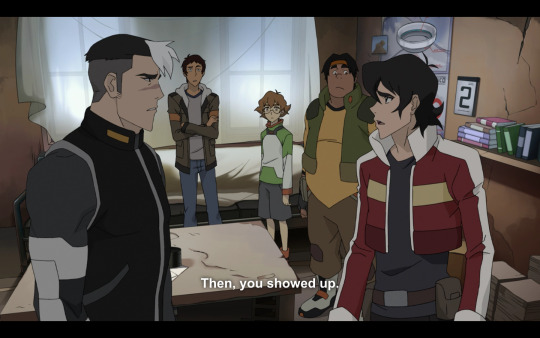
I think the assumption that Keith’s time in the desert was somehow calming or freeing is woefully wrong. We know that Keith hates being alone, that he has deeply rooted abandonment issues that likely stem back to his father. In that sort of context, I think his year in the desert was not something he’d ever want to relive. It was a definite low point in his life, marked by total isolation and completely internalized, bottled up pain.
Yes, he sought a new purpose in the Blue lion and was very driven, very successful. Yes, he was undoubtably a strong willed and tenacious person, clever enough to puzzle out the pieces of a mystery left untouched for millennia. He doesn’t need Shiro to function, and he can certainly work miracles without him. But none of this negates the fact that Keith was also incredibly lonely. That, after losing both Shiro and the garrison, there was not a single person left Keith could turn to.

The thing is, I don’t think Keith would really fall apart over anyone else this way. When they lose Allura, he doesn’t want to leave her, but suggests the idea out of concern for the greater good–something that Allura herself would have wanted as well. For the most part, I think Keith is someone who will save as many people as he can, even at the expense of those close to him. But with Shiro, he just can’t turn his back on him, can’t bear the thought of losing him again. If Shiro’s in trouble, Keith will run to his aid without a second thought. If Shiro threatens to leave, Keith will give him the world to make him stay. In fact, in BOM he does do this, chasing after Shiro even if it costs him everything else he’s ever had.
The words “It’s killing me when you’re away,” don’t feel brotherly to me at all. They’re more reminiscent of heartbreak, following in the same vein of other lines like, “Your friend desperately wants to see you,” and “If it wasn’t for you, my life would be a lot different.” The sense of desperation, of longing and loss; honestly, I’m more inclined to believe these are signs of unrequited love. And after Keith loses Shiro, not only is he outraged–his anger is almost possessive. “We don’t have Shiro anymore–nobody seems to care about that.” This line is powerful because we know it isn’t true. The other paladins are mourning, albeit in their own way. But this notion that You all gave up on Shiro, none of you care about him like I do, seems to be something that Keith has internalized.

We know that all of Team Voltron have expressed they see each other as found family, but Keith directing his anger at everyone else over Shiro does not strike me as familial. It’s like he sees his relationship with Shiro as being on a completely different level from the rest of the team, cares about him in a way that no one else does. If we look at his behavior now and link it back to Kerberos, I think we’d find a lot of similarities. After all, wasn’t he told that Shiro died, wasn’t it likely he was told time and again to just give up and admit Shiro wasn’t coming home? “Shiro is the only one who didn’t give up on me–I won’t give up on him,” sounds like a line of thought he very well could’ve had before. And I’m sure that was a very lonely, painful journey.
“It’s killing me when you’re away,” definitely connotes depression. And at that point in his life, I really do believe Keith wasn’t in a good place. Yes, he was able to pick himself up and find a new purpose. But being strong-willed doesn’t make things any less painful, particularly for a person who’s worst fear is feelings. So maybe it did feel like the oppressive loneliness was killing him at times, maybe he was so overwhelmed by having all this raw emotion and no outlet that he’d just scribble down his thoughts to get them out of his head.
So anon, my feelings on the matter are basically this–we might never know if the note is intentional or not. But, just the mere fact that it’s completely plausible, and fully within the realm of possibility that Keith would do so–I think that alone says a lot.
#shiro#sheith#keith#voltron#meta#long post#anonymous#ok but in all honesty like#i am really attached to the idea that this note is an intentional thing though#even if it Hurts me
341 notes
·
View notes